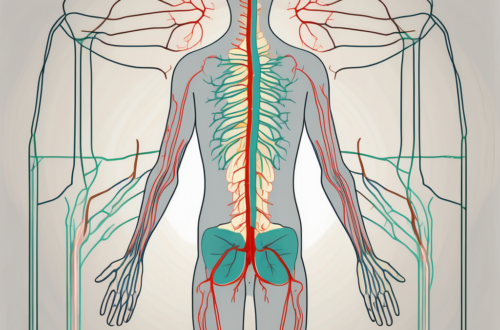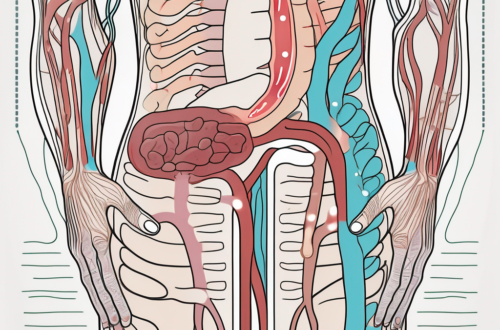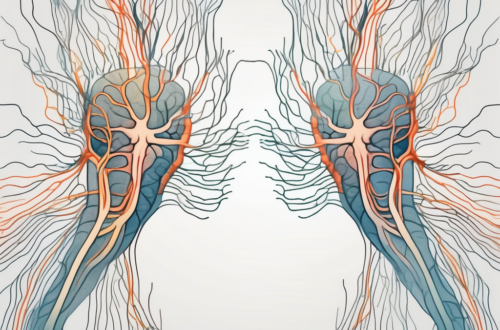The vagus nerve is a vital component of our parasympathetic nervous system, playing a crucial role in regulating our bodily functions. This article aims to provide a comprehensive understanding of the vagus nerve, its functions, and the potential impact it has on our health and well-being. It will also delve into the emerging field of vagus nerve stimulation and highlight future research directions.
Understanding the Vagus Nerve
Anatomy and Location of the Vagus Nerve
The vagus nerve, also known as the tenth cranial nerve, is the longest and most complex cranial nerve in our body. It extends from the brainstem down to the abdomen, innervating various organs along its path.
The vagus nerve primarily arises from the medulla oblongata, a crucial part of the brainstem responsible for controlling vital functions such as breathing and heart rate. From there, it branches out into multiple fibers, forming intricate connections with our body.
As the vagus nerve travels down the neck, it gives off branches that innervate the muscles of the throat and voice box, allowing us to speak and swallow. It then continues its journey into the chest, where it provides sensory and motor innervation to the heart and lungs.
Upon reaching the abdomen, the vagus nerve further divides into branches that innervate various organs, including the stomach, liver, pancreas, and intestines. These branches play a crucial role in regulating digestion and maintaining optimal gastrointestinal function.
Functions of the Vagus Nerve
The vagus nerve is often described as the “wandering nerve” due to its far-reaching nature. Its primary function is to regulate the parasympathetic nervous system, which is responsible for rest, digest, and relax responses.
One essential role of the vagus nerve is its involvement in heart rate regulation. It helps maintain a healthy heart rhythm and can influence heart rate variability, which is a marker of cardiac health.
Additionally, the vagus nerve plays a crucial role in controlling blood pressure. It can stimulate the release of vasodilators, which relax and widen blood vessels, leading to a decrease in blood pressure.
Furthermore, the vagus nerve is involved in the regulation of respiratory function. It helps control the rate and depth of breathing, ensuring that our body receives an adequate supply of oxygen and removes carbon dioxide efficiently.
In addition to its role in cardiovascular and respiratory function, the vagus nerve also contributes to the regulation of various other bodily processes. It stimulates the production of digestive enzymes, promoting efficient digestion and nutrient absorption. The vagus nerve also influences smooth muscle contractions in the gastrointestinal tract, facilitating the movement of food and waste through the digestive system.
Lastly, the vagus nerve is increasingly recognized for its impact on mental health. It connects the brain with various organs, including the gut, and is involved in the bidirectional communication between the brain and the gut, known as the gut-brain axis. This communication pathway plays a significant role in regulating mood, emotions, and overall mental well-being.
Research has shown that stimulating the vagus nerve through techniques such as vagus nerve stimulation (VNS) can have therapeutic effects on various mental health conditions, including depression and anxiety.
In conclusion, the vagus nerve is a remarkable cranial nerve that extends throughout our body, influencing numerous physiological processes. From its role in heart rate regulation and digestion to its impact on mental health, the vagus nerve plays a vital role in maintaining overall well-being.
The Vagus Nerve and the Parasympathetic Nervous System
The Parasympathetic Nervous System Explained
The parasympathetic nervous system is one of the major divisions of the autonomic nervous system. It acts in contrast to the sympathetic nervous system, which is responsible for the “fight or flight” response.
The parasympathetic nervous system helps our body conserve energy and maintain homeostasis. It promotes rest, relaxation, and the maintenance of various bodily functions.
When we are in a state of rest, the parasympathetic nervous system is dominant. It slows down heart rate, lowers blood pressure, and promotes digestion and absorption of nutrients. This state allows our body to conserve energy and focus on repairing and rejuvenating itself.
During restful periods, the parasympathetic nervous system also stimulates the release of digestive enzymes and increases blood flow to the gastrointestinal tract. This promotes efficient digestion and absorption of nutrients, ensuring that our body receives the necessary fuel for optimal functioning.
Furthermore, the parasympathetic nervous system influences various other bodily functions, such as salivation, lacrimation (tear production), and urination. It helps maintain the body’s internal environment by regulating processes like sweating and controlling the constriction of certain blood vessels.
How the Vagus Nerve Influences the Parasympathetic Nervous System
The vagus nerve acts as the primary mediator of the parasympathetic nervous system, transmitting signals from the brain to various organs.
Originating in the medulla oblongata, the vagus nerve extends down the neck and branches out to innervate multiple organs, including the heart, lungs, stomach, liver, and intestines.
When stimulated, the vagus nerve releases acetylcholine, a neurotransmitter that slows down heart rate, increases digestive secretions, and promotes general relaxation in the body.
Through its vast network of connections, the vagus nerve helps orchestrate the parasympathetic responses needed for rest, digestion, and recovery after periods of stress or exertion.
The vagus nerve also plays a crucial role in the mind-body connection. It is involved in regulating emotions, reducing anxiety, and promoting feelings of calmness and well-being. This connection explains why activities such as deep breathing exercises, meditation, and gentle yoga can activate the vagus nerve and elicit a relaxation response.
Moreover, recent research has highlighted the potential therapeutic benefits of vagus nerve stimulation in various medical conditions. It has shown promise in treating epilepsy, depression, anxiety disorders, and even inflammatory diseases like rheumatoid arthritis and Crohn’s disease.
In conclusion, the parasympathetic nervous system, with the vagus nerve as its primary mediator, plays a vital role in maintaining balance and promoting relaxation in our body. Understanding the intricate workings of this system can help us prioritize rest, self-care, and stress management in our daily lives.
The Vagus Nerve’s Impact on Health and Well-being
The vagus nerve, also known as the “wandering nerve,” is the longest cranial nerve in the body, extending from the brainstem to various organs throughout the body. It plays a crucial role in regulating many bodily functions, including heart rate, digestion, and mental health.
The Vagus Nerve and Heart Rate Regulation
When it comes to heart health, the vagus nerve takes center stage. It acts as a communication highway between the brain and the heart, constantly sending signals to regulate heart rate and rhythm. Studies have shown that individuals with better vagal tone, an indicator of vagus nerve activity, have a lower risk of cardiovascular diseases.
A high heart rate variability, influenced by the vagus nerve, is associated with better cardiovascular health. This means that the time intervals between heartbeats are not constant, but rather fluctuate in response to various factors. On the other hand, a reduced vagal tone has been linked to an increased risk of heart disease.
It is important, however, to consult with a healthcare professional for an accurate assessment of heart rate variability and to discuss any concerns regarding cardiac health. They can provide personalized guidance on how to optimize vagus nerve function and maintain a healthy heart.
The Vagus Nerve’s Role in Digestion
Our digestive system relies heavily on the vagus nerve for proper functioning. When the vagus nerve is activated, it stimulates the production of digestive enzymes, increases blood flow to the gastrointestinal tract, and enhances the rhythmic contractions necessary for efficient digestion.
Disorders such as gastroparesis, characterized by delayed emptying of the stomach, have been associated with vagus nerve dysfunction. In such cases, medical intervention or vagus nerve stimulation therapies may be considered under the guidance of a healthcare professional. These interventions aim to restore proper vagus nerve function and improve digestive health.
Furthermore, emerging research suggests that the gut-brain connection, facilitated by the vagus nerve, plays a significant role in overall well-being. A healthy vagus nerve helps maintain a balanced gut microbiome, which has been linked to improved digestion, immune function, and even mental health.
The Vagus Nerve and Mental Health
The connection between the vagus nerve and mental health has gained considerable attention in recent years. Research suggests that vagus nerve stimulation techniques may have a beneficial effect on conditions such as depression, anxiety, and post-traumatic stress disorder.
Vagus nerve stimulation involves the use of electrical impulses to activate the nerve, promoting a sense of calm and relaxation. This technique has shown promising results in some individuals, but it is still being studied and is not considered a standalone treatment for mental health disorders.
It is essential to note that vagus nerve stimulation should only be pursued under the guidance of a healthcare professional who can provide proper assessment, monitoring, and adjustment of the therapy. They can determine if vagus nerve stimulation is appropriate for an individual’s specific condition and guide them through the process to ensure safe and effective outcomes.
In conclusion, the vagus nerve plays a vital role in maintaining overall health and well-being. Its influence on heart rate regulation, digestion, and mental health highlights its significance in various bodily functions. Understanding the intricate connection between the vagus nerve and these aspects of health can empower individuals to take proactive steps in optimizing their vagus nerve function and promoting their overall well-being.
The Potential of Vagus Nerve Stimulation
The vagus nerve, also known as the “wandering nerve,” is the longest cranial nerve in the body. It extends from the brainstem to the abdomen, innervating multiple organs along the way. This nerve plays a crucial role in regulating various bodily functions, including heart rate, digestion, and inflammation.
Vagus nerve stimulation (VNS) is a therapeutic technique that involves the electrical stimulation of the vagus nerve. This stimulation is typically achieved through the implantation of a small device, similar to a pacemaker, that delivers electrical impulses to the nerve.
Studies have shown that VNS can have positive effects on various conditions, including epilepsy, depression, and migraines. The exact mechanisms by which VNS exerts its therapeutic effects are not fully understood, but researchers believe that it may modulate the activity of the autonomic nervous system and influence the release of neurotransmitters in the brain.
The Science Behind Vagus Nerve Stimulation
When the vagus nerve is stimulated, it sends signals to the brain, activating various neural pathways. One of the key pathways involved in VNS is the locus coeruleus-norepinephrine system, which is responsible for regulating mood, attention, and stress responses.
By modulating the activity of this system, VNS has been found to alleviate symptoms of depression and improve mood in some individuals. It is believed that the electrical impulses delivered by the VNS device can enhance the release of norepinephrine, a neurotransmitter that plays a crucial role in mood regulation.
In addition to its effects on mood, VNS has also shown promise in the treatment of epilepsy. Epilepsy is a neurological disorder characterized by recurrent seizures, and traditional treatment options, such as medication, may not be effective for everyone. VNS offers an alternative approach by providing continuous stimulation to the vagus nerve, which can help reduce the frequency and severity of seizures.
Therapeutic Applications of Vagus Nerve Stimulation
While VNS has shown promising results in the treatment of epilepsy and depression, researchers are now exploring its potential therapeutic applications in other areas as well.
Chronic pain management is one area where VNS is being investigated. Chronic pain conditions, such as fibromyalgia and neuropathic pain, can be debilitating and difficult to treat. VNS offers a non-invasive option that may help alleviate pain by modulating the pain signals transmitted through the vagus nerve.
Inflammatory disorders, such as rheumatoid arthritis and Crohn’s disease, are another area of interest for VNS research. Inflammation is a complex process involving the immune system, and dysregulation of this process can lead to chronic inflammatory conditions. By modulating the activity of the vagus nerve, VNS may help regulate the immune response and reduce inflammation.
Neurodegenerative diseases, such as Alzheimer’s and Parkinson’s, are also being explored as potential targets for VNS. These diseases are characterized by the progressive loss of neurons in specific regions of the brain. VNS may offer a neuroprotective effect by promoting the survival and function of neurons, potentially slowing down the progression of these diseases.
It is important to note that while VNS shows promise in these areas, further research is needed to fully understand its effectiveness and potential side effects. As with any medical intervention, it is crucial to consult with a healthcare professional who can assess individual circumstances and provide guidance on the most suitable treatment options.
Future Research Directions for the Vagus Nerve
Unexplored Areas of Vagus Nerve Function
Despite the significant progress in understanding the vagus nerve, there are still many aspects that require further exploration. Research is ongoing to delve into the intricacies of vagus nerve connections, its role in immunity, and its potential influence on cognitive functions.
One area of interest is the vagus nerve’s connection to the gut microbiome. Recent studies have suggested that the vagus nerve plays a crucial role in the bidirectional communication between the brain and the gut. By further investigating this connection, scientists hope to uncover new insights into the role of the vagus nerve in gastrointestinal disorders, such as irritable bowel syndrome and inflammatory bowel disease.
Another unexplored area is the vagus nerve’s involvement in emotional regulation. While it is known that the vagus nerve plays a role in the body’s stress response, its precise mechanisms in regulating emotions are not fully understood. By conducting more research in this area, scientists may be able to develop targeted interventions for individuals with mood disorders, such as depression and anxiety.
Furthermore, the vagus nerve’s role in pain modulation is still not completely elucidated. While it is known that the vagus nerve can dampen pain signals, the exact mechanisms by which it does so remain unclear. Investigating this aspect of vagus nerve function could potentially lead to the development of new pain management strategies.
By unraveling these unexplored areas, scientists aim to unlock a deeper understanding of the vagus nerve’s impact on our overall health and well-being.
The Vagus Nerve and Potential Medical Breakthroughs
The vagus nerve holds great promise for potential medical breakthroughs. Exploring novel therapeutic interventions, further understanding the vagus nerve’s role in conditions such as Parkinson’s disease and obesity, may lead to innovative treatment approaches.
Recent studies have suggested that stimulating the vagus nerve through techniques such as vagus nerve stimulation (VNS) could have a positive impact on individuals with Parkinson’s disease. VNS has shown potential in reducing motor symptoms and improving quality of life in some patients. However, more research is needed to fully understand the mechanisms behind this effect and to optimize the use of VNS as a treatment for Parkinson’s disease.
In the realm of obesity, the vagus nerve has been identified as a potential target for interventions aimed at weight management. By modulating the activity of the vagus nerve, researchers hope to develop strategies that can suppress appetite and promote satiety, ultimately aiding in weight loss efforts. However, further studies are necessary to determine the long-term effectiveness and safety of these interventions.
As research progresses, it is crucial for individuals to stay informed about the latest developments in the field of vagus nerve research and consult with healthcare professionals to understand how these advancements may impact their own health.
Conclusion
The vagus nerve’s pivotal role as the primary parasympathetic nerve cannot be understated. Its influence on our heart rate, digestion, and mental well-being highlights the importance of maintaining its healthy functioning.
As research continues to unveil new discoveries and potential therapeutic interventions, it is crucial to approach the topic with curiosity and a desire to consult with healthcare professionals who can guide us toward making informed decisions regarding our health and well-being.





